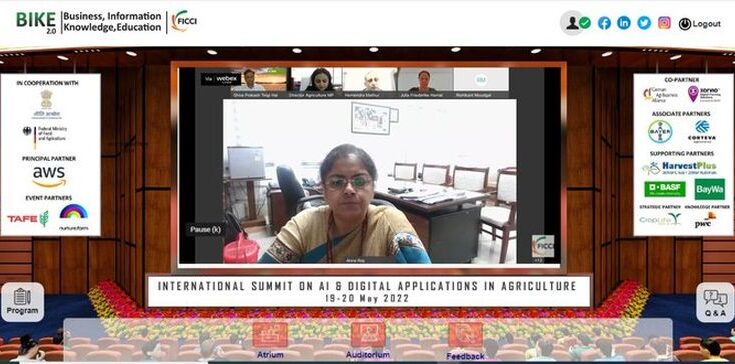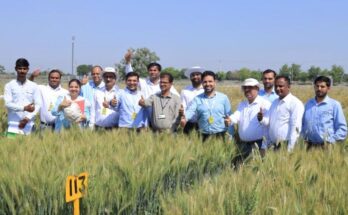Anna Roy, Senior Adviser, NITI Aayog today said that Indian startup ecosystem is robust. “By providing them with enabling framework including access to data, compute and market, we will be able to tackle the issue of technology adoption in the agriculture sector,” she said while addressing the 2nd edition of the international conference on ‘Artificial Intelligence & Digital Applications in Agriculture’, organised by FICCI, jointly with German Agribusiness Alliance.
Speaking at the occasion, Roy said that the National Strategy for Artificial Intelligence released by NITI Aayog in June 2018 identifies agriculture as one of the focus areas. The benefits of applying AI in agriculture are immense. “AI in the areas of weather, soil nutrients, pest and disease management, fertigation, market prices, finance and traceability have shown a lot of potentials. India’s burgeoning startup ecosystem has been actively playing its part in disrupting the agriculture sector. Opportunity in agritech exists across the value chain from improving farmers’ access to markets, inputs, data, advisory, credit and insurance,” she added.
Roy also said that technology is something which needs to be understood and understood in the context of not only its development but its use. “It is the adoption which will also nurture the development of the technology,” she added. Agriculture along with education and health is one of the sectors where government plays a critical role in the adoption of technology because of the nature of the sector, especially in the context of India, emphasised Roy.
You may also like to read: What does FICCI-PwC report recommend for redefining agriculture through artificial intelligence? Read here…
Highlighting the use of AI and other digital technologies in a transparent way, Prof Dr Engel Friederike Arkenau, Commissioner for Digitization, Head of Directorate Digital Innovation, Federal Ministry of Food and Agriculture, Germany said that the use of AI and other digital technologies in a transparent way can also be a great help to achieve the overall goal of sustainable agriculture worldwide. “Sustainability is a result of a balanced interplay between economy, environment and social spheres. This needs collaboration, cooperation and co-creation as a very important element,” she added.
Underlining the potential of AI in the transformation of the agriculture sector, TR Kesavan, Chairman, FICCI National Agriculture Committee & Group President, Tractors and Farm Equipment (TAFE) said that AI is expected to play a key role in the growth of Indian agriculture relieving the sector from stressful conditions and catalysing shift towards data-driven farming. “Digital solutions including AI has the potential to shift the country toward deploying best technology interventions in meeting its dual goals of raising income for smallholder farmers as well as continuing to strengthen the competitiveness of Indian agriculture through data-driven decision making,” he added.
Speaking on digital solutions proving to be a game-changer in agriculture, Julia Harnal, Chairperson, German Agribusiness Alliance & VP, Public Affairs Agricultural Solutions, BASF SE said, “Despite the challenging times we are living in, the agriculture sector in India and around the world has proven to be strong. Digital solutions surely are a ‘game-changer’ in many aspects. Not only can they support enhancing the resilience of production, but they can also support farmers to produce efficiently and sustainably.”
You may also like to read: Unnati launches drone spray service for farmers
Deepti Vikas Dutt, Head, Strategic Initiatives, Public Sector, Amazon Internet Services said, “For the agriculture sector to leapfrog, tech innovation needs to be complemented by business model innovation from startups and procurement model innovation from the government.”
Emphasising the need of transforming artificial intelligence into agricultural intelligence, Ashok Varma, Partner and Leader – Social Sector, PwC India said, “AI-enabled models in agriculture and allied sectors are imperative. To transform AI to agriculture intelligence leading to widespread adoption of technology, a 3S strategy is required- Scale, Skill and Service”.
Speaking on the scalability of technologies in agricultural practices, Pankaj K Dwivedi, Head of BD & Agronomy, Nurture.farm said, “Technologies are abundant in agriculture. The incentive to adopt and the ability to deploy in the field at scale is the key. We are trying to do this on an integrated platform.”
Speaking on capitalising on the potential of modern technologies in the agriculture sector, Hemendra Mathur, Chairman, FICCI Task Force on Agri Start-ups & Venture Partner, Bharat Innovation Fund said that the use of AI and digital applications in the agriculture sector is here to stay and transform the sector. “There is a need to capitalise on the potential offered by digitisation and AI technologies with a goal to develop an efficient and transparent data-driven supply chain,” he added.





